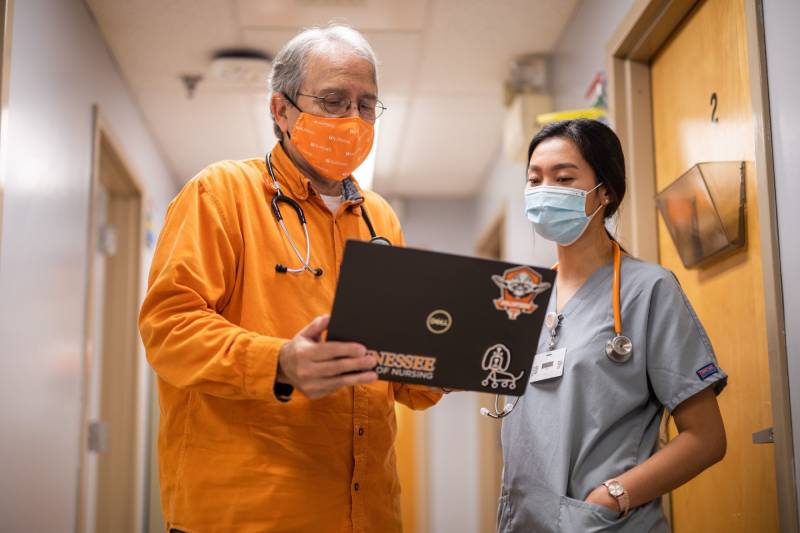
The Bachelor of Science in nursing program combines the unique resources of the UT campus with health care agencies in a manner that enables both faculty and students to participate fully in all facets of the health care delivery system.
Facilities at the College of Nursing include a human patient simulator, a clinical practice laboratory, and technology enhanced classrooms. Clinical instruction is offered for students in major hospitals, community clinics, health departments, and schools in the region.

High school students apply for direct admission to the nursing major as freshman through the Undergraduate Office of Admissions. Freshman direct admission to the nursing major is a highly competitive application process.
The College of Nursing takes into consideration a wide range of factors when making admission decisions. Beginning with the fall 2024 freshmen direct admit pathway, we require students to complete the Holistic Admissions Questionnaire to be considered for admission into our Traditional Bachelor of Science in Nursing program.
The final deadline for high school students applying as a freshman to the nursing major is December 15 of the applicant’s senior year. Space for the nursing major is limited; high school students are encouraged to apply as early as August. Freshman applicants must indicate the major code of Nursing when applying through the UT Office of Undergraduate Admissions.
Applications received after December 15 will not be considered for admission to the nursing major.
Applicants may apply online through Undergraduate Admissions.
Applicants must meet the statewide US history requirement for a bachelor’s degree (either one unit at the high school level or 6 credit hours at the college level).
Note: Freshman applicants who anticipate earning more than 45 hours of dual enrollment credits or earning an Associate of Arts or Associate of Science degree upon high school graduation must contact the College of Nursing, Office of Student Services once they have submitted a freshman application to the Undergraduate Admissions Office.
Current UT students and transfer students from other institutions can apply for an open position in the nursing program. The change of major and transfer student application is the secondary route for entry into nursing after the student has completed the required lower-division coursework and is ready to begin the junior upper division of nursing courses.
Application to the College of Nursing follows this process:
Note: Students not enrolled at the University of Tennessee, Knoxville, who are applying to nursing must also complete a transfer undergraduate application to the University of Tennessee and the NursingCAS application. Transcripts sent to Undergraduate Admissions are not available to the College of Nursing, so students must also attach unofficial copies to the online change of major/transfer student application. Admission to the University of Tennessee through Undergraduate Admissions does not guarantee admission to the College of Nursing BSN program.
The University of Tennessee Medical Center (UTMC) and the University of Tennessee, Knoxville, College of Nursing have partnered to create a new undergraduate nursing pathway at a satellite campus adjacent to UTMC. The BSN Scholars Program is a robust academic-practice partnership that will offer nursing students an opportunity to learn and train inside UTMC, the region’s academic medical center. Students accepted will attend class and complete their clinical rotations at UTMC with access to an onsite learning lab and simulation center at the satellite campus, which is located in the UT Research Park at Cherokee Farm. This program has the same accreditation standards and follows the same mission, vision, values, and honor code as the existing programs. Students in the BSN Scholars Program will have scholarship tuition from UTMC with a three-year work commitment post-graduation.
Application to the BSN Scholars follows this process:
Interested in learning more about BSN Scholars? Fill out an interest form here.
The baccalaureate nursing curriculum is guided by the following assumptions:
• Persons and their health and well-being are the focus of nursing.
• Nursing is a caring practice profession, an art, and a scientific discipline.
• Persons are influenced by a complex environment (both internal and external) that affects their health and well-being.
• A goal for nursing is to modify environmental factors to promote, maintain and restore health.
The curriculum integrates the themes of holism, diversity, and caring and emphasizes critical thinking, communication and leadership, and management principles and skills.
A broad base of general education, a thorough study of human behavior; an emphasis on health maintenance, promotion, and restoration; and a strong family and community orientation are all essential components of baccalaureate nursing education.
Maintaining a high-quality relevant program responsive to the increasing complexity of health care delivery, the changing health needs of society, and the changing and expanding role of the nurse enables graduates of the program to:
• Assume beginning leadership positions in a variety of settings
• Work collaboratively with other health professionals
• Function as socially conscious and contributing citizens
• Pursue advanced education on either a formal or informal basis